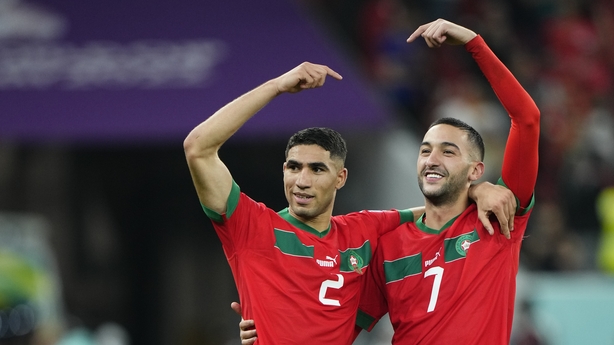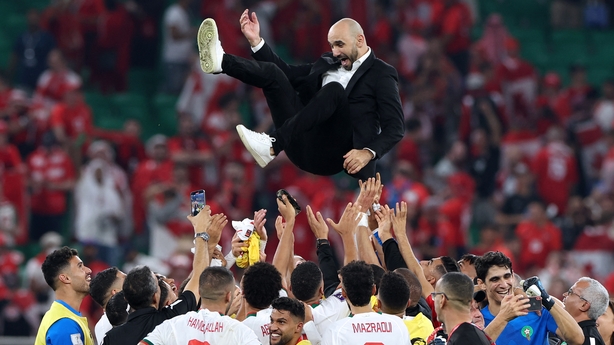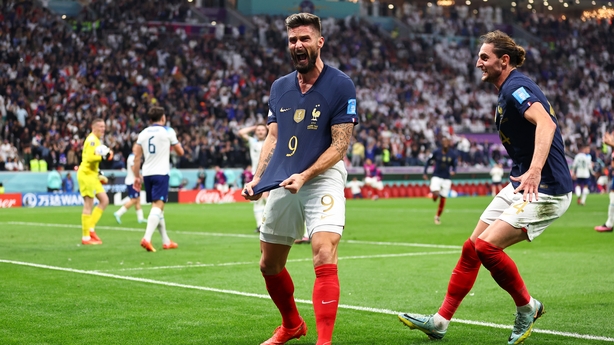Morocco are roaming deep in bonus territory but as their redoubtable manager Walid Regragui says, the "crazy" dream is still alive.
Regardless of what transpires at the Al Bayt Stadium tonight, the Atlas Lions have already created history in Qatar, eclipsing the achievements of Cameroon (1990), Senegal (2002) and Ghana (2010) in becoming the first African side to reach the last four.
Parallels to Ireland 1988-90 have been drawn, both in terms of the emotional outpouring their run has sparked and their heavy reliance on the diaspora. Their style of play has also attracted the sniffy disdain of the game's bigger powers, even as they've struggled to cope with it.
Four of their starting XI against Portugal were born in Morocco, though it's worth noting that Bono, the goalkeeper who launched a thousand U2 puns, returned to Casablanca from Quebec with his family (obviously) at three years of age.
The team is stacked with first-generation Moroccan immigrants from Spain, the Netherlands, France and Belgium, all of whom harbour a strong loyalty to the land of their parents.
Chelsea's Hakim Ziyech, their most high-profile player at club level, is a classic case, having previously represented the Netherlands at both Under-20 and Under-21 level.

In 2015, he switched his allegiance to Morocco, to the consternation of Marco Van Basten, then assistant manager with the Dutch and Ziyech's one-time club coach at Heerenveen.
"His market value as an international player for the Netherlands could have been so much higher," observed Van Basten wearily.
Ziyech's own comments on the matter at the time indicated he wasn't much pre-occupied with his market value.
"I ask myself: 'Where does the heart go? Although I was born in the Netherlands, I feel Moroccan.
"Many people don't understand that feeling," he added.
Morocco's progress has shown up the acknowledged limitations of xG as a predictor of outcomes. (This being 'Expected Goals' for the uninitiated and the casual followers)
They are currently zero from five in the xG stakes in their five games played, none of which, of course, they wound up losing. This is in stark contrast with Argentina, who are unassailable via this metric.
Their 'xG difference' - for those who set store by these numbers - is -1.74, easily the worst of all the weekend's quarter-finalists.
One man who doesn't set much store by xG is Regragui, who holds the concept in much the same regard as Howard Wilkinson presumably does.
"All this talk about possession... It's surreal what it does to people," Regragui said on Tuesday.
"Teams can have 70% possession and only two shots. And then you've got the obsession with xG - 'we should have won, we had 4 xG!'
"We are here to win, that's all."

They subsisted on a mere 27% of possession against Portugal but kept clear-cut chances to a minimum and struck themselves shortly before half-time, Youssef En-Nesyri, of Sevilla, taking advantage of hesitation in the Portuguese box to head home what proved to be the winner.
Spain's Rodri was magnificently sour in the aftermath of the last-16 game, upset the Moroccans hadn't set up in a manner more accommodating to the sedate Spanish attack.
"Morocco offered absolutely nothing," the Man City midfielder spat. "Without disrespecting them. In the game, they did nothing. They just waited for the counters."
While their efficiency up front has been impressive, the bald numbers make clear what is Morocco's strength. In five games, they've conceded just one goal, an own goal against Canada when leading 2-0.
Otherwise, they've kept four clean sheets in four games, all against top tier European opposition. (Even in the penalty shootout, they held the opposition scoreless).
Bono has been the fly in the ointment of many an opposition attack, while their screening defensive midfielder Sofyan Amrabat, currently at Fiorentina, is likely to attract attention from bigger clubs after a series of stellar performances in Qatar.
One pang of worry ahead of the semi-final is the absence of their captain, Besiktas centre-half Romain Saiss, who was forced off injured after an hour against Portugal and has not recovered in time.
Also worrying for the Moroccans is that the French don't appear to be encumbered by complacency, they could hardly be at this point. Didier Deschamps is offering the north African side full respect ahead of the game.
"They have the best defence at this World Cup," observed the French manager. "They are extremely well organised, they keep their shape very well and they also have some very good attackers when they break."
There's no question that tonight's semi is their most intimidating challenge yet.
So far, they've beaten a Belgium team of questionable morale, likely riven by infighting, and a Spanish team addicted to dawdling in possession and lacking a killer thrust - in other words, perfectly vulnerable to Morocco's well-honed counter-attacking game.
In the semi-final, they're facing a far more potent animal. From the opening week, France have looked the most complete team in the competition, making light of their high-profile absences.
France, as is their habit, played within themselves for long stretches against England, notably after they took the lead early.
With 20 minutes left, the momentum of the contest was still swinging hard against them. They were shrinking in the face of England's energetic midfield, surviving partially thanks to the Brazilian referee Wilson Sampaio's cack-handed embrace of European-style laissez-faire officiating.
But they hung tough at the back and were able to find the winner at the other end. The masterful Antoine Griezmann curling in a vicious cross from tight to the left touchline, Olivier Giroud meeting it with a glancing header at the near post. The striker had redeemed himself after a missing a sitter only a moment earlier.
With Kylian Mbappe relatively subdued, the French were not at their slick best but their know-how and killer instinct saw them through in one of the signature games of the tournament thus far.

France's defence looked a tad creaky against England, with Bayern Munich's Dayot Upamecano struggling to contain Harry Kane, and the prime beneficiary of the referee's 'let-if-flow' philosophy. Fortunately for the French, the oft-criticised Hugo Lloris was in fine form, aside from one moment where he badly lost the flight of the ball at a corner.
Many analysts are now arguing that Griezmann is a more compelling candidate for player of the tournament than Mbappe, the latter previously regarded as a shoo-in if France got the job done.
The 31-year-old's reinvention as a midfielder has been hailed as a masterstroke by Deschamps and his stunning cross for Giroud's winner was the game's decisive moment on Saturday.
The manager himself seems strangely unappreciated despite winning the World Cup last time out - emulating Franz Beckenbauer by winning as both captain and manager in the process. A romantic hero like Eric Cantona - who plainly despises him - dubbing Deschamps a "water carrier" as a player and, latterly, "an accountant" as a manager probably hasn't helped his public image.
But if all goes to plan for France this week, then Deschamps will have been a central figure in three World Cup wins, and will become the first manager to win it twice since Italy's Vittorio Pozzo in the 1930s. He could yet become an immortal accountant.
The Moroccans' run carries inevitable echoes of Greece 2004 and it'd be foolish to count them out on recent evidence. But France are a cut above and logic indicates they should have enough to book their spot in Sunday's final, if only after a struggle.
Listen to the RTÉ Soccer podcast on Apple Podcasts, Spotify or wherever you get your podcasts.
We need your consent to load this rte-player contentWe use rte-player to manage extra content that can set cookies on your device and collect data about your activity. Please review their details and accept them to load the content.Manage Preferences








